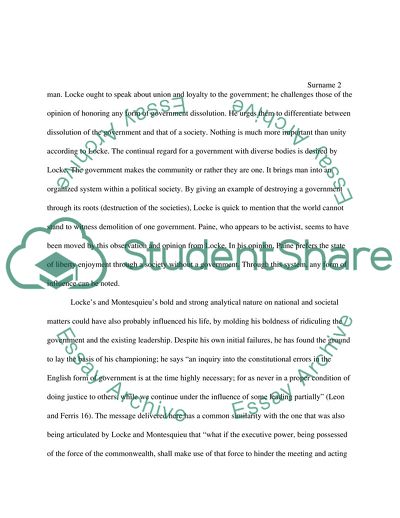Cite this document
(In What Ways Is It Evident That Paine and Publius Were Influenced by Montesquieu and Locke Essay Example | Topics and Well Written Essays - 1500 words, n.d.)
In What Ways Is It Evident That Paine and Publius Were Influenced by Montesquieu and Locke Essay Example | Topics and Well Written Essays - 1500 words. https://studentshare.org/philosophy/1853274-in-what-ways-is-it-evident-that-paine-and-publius-were-influenced-by-montesquieu-and-locke
In What Ways Is It Evident That Paine and Publius Were Influenced by Montesquieu and Locke Essay Example | Topics and Well Written Essays - 1500 words. https://studentshare.org/philosophy/1853274-in-what-ways-is-it-evident-that-paine-and-publius-were-influenced-by-montesquieu-and-locke
(In What Ways Is It Evident That Paine and Publius Were Influenced by Montesquieu and Locke Essay Example | Topics and Well Written Essays - 1500 Words)
In What Ways Is It Evident That Paine and Publius Were Influenced by Montesquieu and Locke Essay Example | Topics and Well Written Essays - 1500 Words. https://studentshare.org/philosophy/1853274-in-what-ways-is-it-evident-that-paine-and-publius-were-influenced-by-montesquieu-and-locke.
In What Ways Is It Evident That Paine and Publius Were Influenced by Montesquieu and Locke Essay Example | Topics and Well Written Essays - 1500 Words. https://studentshare.org/philosophy/1853274-in-what-ways-is-it-evident-that-paine-and-publius-were-influenced-by-montesquieu-and-locke.
“In What Ways Is It Evident That Paine and Publius Were Influenced by Montesquieu and Locke Essay Example | Topics and Well Written Essays - 1500 Words”. https://studentshare.org/philosophy/1853274-in-what-ways-is-it-evident-that-paine-and-publius-were-influenced-by-montesquieu-and-locke.


